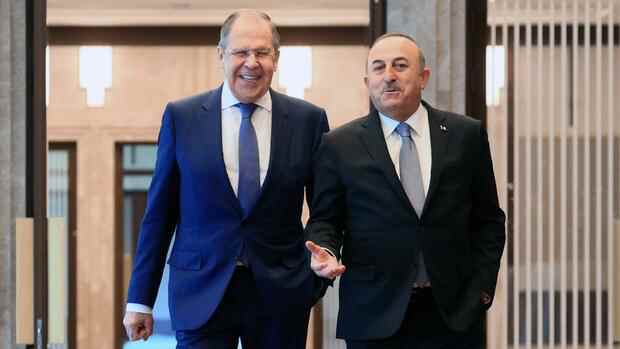The Russian and Turkish foreign ministers yesterday in Ankara: Although a NATO member, Turkey is trying to play a neutral role in the conflict with Russia.
(Photo: IMAGO/SNA)
Istanbul
On Wednesday morning the foreign ministers of Russia and Turkey held talks in Ankara on ending the blockade of Black Sea ports for grain exports. But there was massive trouble beforehand: the Ukrainian ambassador to Turkey complained that his country was being left out of the negotiations.
“Decisions about agricultural products in Ukraine should be made with the participation of all interested parties,” declared Wassyl Bodnar – and was even clearer: “We reject agreements that do not take Ukraine’s interests into account.”
His government is currently working with the United Nations “and our partners” on the possibility of establishing a humanitarian corridor for agricultural exports from Ukraine. Turkey is apparently no longer one of Ukraine’s partners.
This is tantamount to a vote of no confidence in Turkey as a mediator in the Ukraine war. In fact, during the talks between Russian Foreign Minister Sergey Lavrov and his Turkish colleague Mevlut Cavusoglu, Ukraine was discussed to the detriment of the country. Lavrov blamed Ukraine itself for the blockade of Ukrainian grain in Black Sea ports. Ukraine has so far refused to clear its ports or otherwise allow cargo ships to pass through.
Top jobs of the day
Find the best jobs now and
be notified by email.
In fact, the Russian Navy has been blockading the Ukrainian Black Sea ports for more than three months since the war of aggression against the neighboring country began. Ukraine, the world’s fourth largest grain exporter, is therefore stuck on its own stocks.
>> Read also: Price limits and protectionism: How emerging countries are fighting the looming hunger crisis
According to Ukrainian data, more than 23 million tons of grain and oilseeds cannot be exported. Before the war, 90 percent of exports went beyond the ports. Three of them – Mariupol, Berdiansk and Kherson – are under Russian control. The port in Mykolayiv was badly damaged, so negotiations are now primarily about the release of Odessa.
But the uneasiness in Kyiv is not only growing because people feel left out of the talks. The Ukrainian ambassador to Turkey also claims that grain stolen from Ukraine turned up in Turkey and from there was sold to other countries. Wassyl Bodnar said Turkey was also among the recipient countries of the stolen grain. His embassy is preparing criminal proceedings against individuals and companies involved in the sale of the goods. One is supported by the international police agency Interpol.
“Anyone involved in the sale of stolen goods will be found and brought to justice,” the ambassador said. Bodnar warned that companies doing business with Russia would be barred from participating in future projects to rebuild Ukraine.
Turkey’s Minister of Agriculture Vahit Kirisci said over the weekend that “Ukraine has agreed to give us a 25 percent discount on grain if the deal goes through,” Kirisci said. Turkish government officials have repeatedly spoken of a joint agreement between Ankara, Kyiv and Moscow that would stipulate the transfer of up to 25 million tons from Odessa to Istanbul.
25 million tons of Ukrainian grain cannot currently be shipped because the sea route across the Black Sea is blocked.
(Photo: IMAGO/ITAR-TASS)
In this context, Ukraine accuses Turkey of massive self-interest. Many Middle Eastern countries, including Egypt, Tunisia and Algeria, depend on grain exports from Ukraine. Giving Turkey control of the grain would increase Ankara’s importance in the region, but Ukraine itself would be left behind.
And then there is the lack of understanding that Turkey is blocking Sweden’s and Finland’s accession to NATO. As a result, Ukraine sees its own position weakened. If the two countries join the defense alliance, Russia would strengthen its own military in northern Europe, tying up forces that would then not be available for the war in Ukraine.
Turkey has seen itself as a mediator since the war began at the end of February. Ankara has not participated in sanctions against Moscow – except for blocking its airspace to military and civilian planes bringing soldiers into Syria from Russia. In March, Ukrainian and Russian delegations met in Istanbul. Lavrov and his Ukrainian counterpart Dmytro Kuleba had previously met in the Mediterranean city of Antalya.
More: How Turkey wants to prevent a global hunger crisis.

